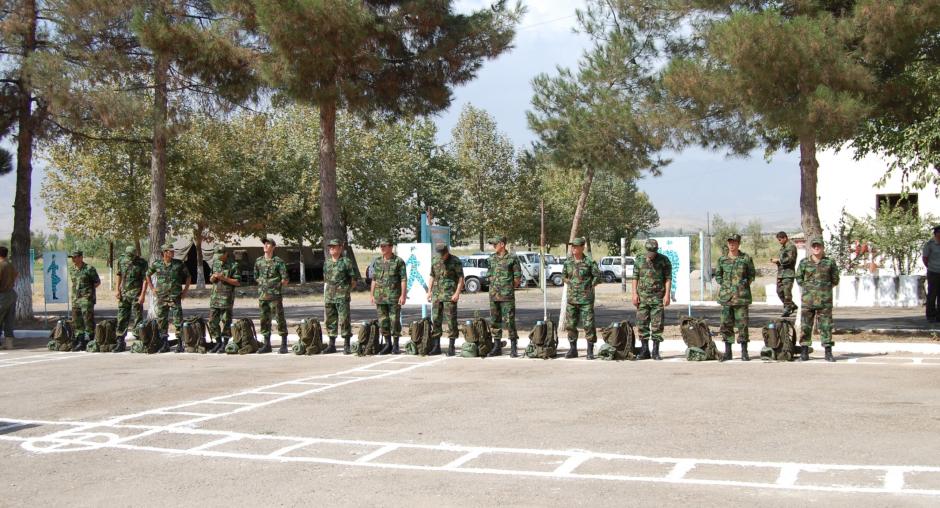Tough training in a rugged environment for Tajik special forces border patrols
On 18 September 2009, 14 young border guards in uniform solemnly lined up at the edge of their base's central square in the town of Gissar in preparation for the graduation ceremony that would mark the successful conclusion of the tactical training course they had participated in for the past two months.
The men were members of the newly-established Special Forces Group of the Tajik Border Troops, and the training they had completed was a new OSCE course designed to help them carry out the hugely significant task of increasing state security at the state borders, especially on the challenging southern border with Afghanistan. High Tajik Border Troops officials and representatives of the OSCE Office in Tajikistan looked on as they stepped up to receive their certificates.
The training course was the first of its kind to be offered in a Central Asian country by any international institution. It was one of the first tangible outcomes of the Memorandum of Understanding the OSCE Office in Tajikistan signed in July 2009 with the Tajik authorities, defining the framework for a comprehensive patrol programming and leadership project.
In addition to offering a series of specialized courses like the one that concluded in September, the OSCE Office in Tajikistan is planning to donate the vehicles and other equipment used during the training to the Tajik border troops when the programme ends.
Studying, drilling and playing hard
During the two-month course, instructors from the OSCE Office in Tajikistan introduced the young border guards to the theory of operations, patrol programming and emergency medical skills and led field exercises in which the students could apply their freshly-acquired knowledge. Other OSCE and outside guest lecturers also contributed to the training, speaking on topics such as mine awareness, human rights, Tajik legislation on the use of force and the current situation in Afghanistan.
The field exercises could last for several days. They always started with mission orders. "Orders are the most important part of the mission," Alexander Pozhidaev, Project Team Leader, declared. "Literally everything is planned from before the beginning to after the end."
During the missions, the students practised map and compass reading, day and night navigation and observation, tactical patrol movement, camouflage, construction of observation posts, survival hygiene and dealing with alpine hazards. They learned to treat any kind of wound sustained in the field, from a bullet injury to a snake bite, and to manage cases of extreme stress.
As soon as the patrol groups got back to the base, they had to draft a mission report. Documenting information collected in the field was something totally new for many of the border patrols and, according to some, one of the toughest parts of the field practices. "After the mission," one student said, "we are sleep-deprived and drained, but we have to sit down together and prepare the reports before being able to rest."
In spite of the gruelling training, there was time for play. One morning, before setting off for another field practice that would last overnight, the trainers met the students on the volleyball field and told them they would now be competing for their Meals Ready to Eat (MREs) - supplementary combat rations. The students immediately took up the challenge. "They showed unity and excellent co-ordination, which are essential skills for conducting difficult missions on the borders," tactical instructor Paul Picard commented, "and that is why they won. They truly deserved it!"
Sharing a tragic loss
Instructors and students spent eight weeks together. They learned to know each other. The group shared not only good and rewarding moments but also difficult and even tragic times, particularly when Czeslaw Bielawski, the project logistic officer, died in an accident during an off-duty rock-climbing activity.
Two days before, Czeslaw had taught them practical skills in a field exercise. "Despite his administrative job in the project, Czeslaw loved to teach; he knew how to communicate knowledge in simple terms. He was a marvellous teacher and the students felt it. They appreciated him very much," recalls instructor Peter Kitzberger, one of his oldest friends from the Border Monitoring Operation in Georgia.
"The students got very emotional the morning we announced the death of our dear colleague," says medical training officer David Razmadze, "but we had to carry on with our training activities."
Ready to return to daily work
As the course drew to a close, the students started to show signs of fatigue, yet their motivation remained unwavering. "Indeed, they showed us that, despite adversity, they would fulfil their assigned mission," observed Picard. "They knew that the skills they were learning would become handy very soon, when they got back to their daily work at the border."
"The better we learn," one student said, "the more efficient we will become... and it will make our country and our children safer."

